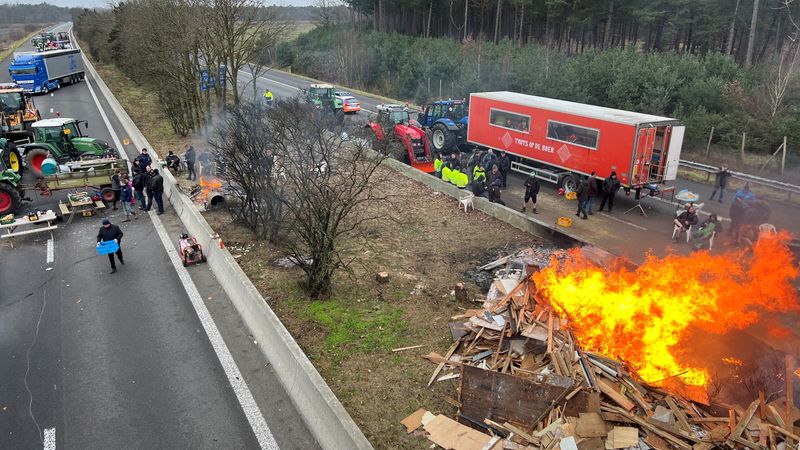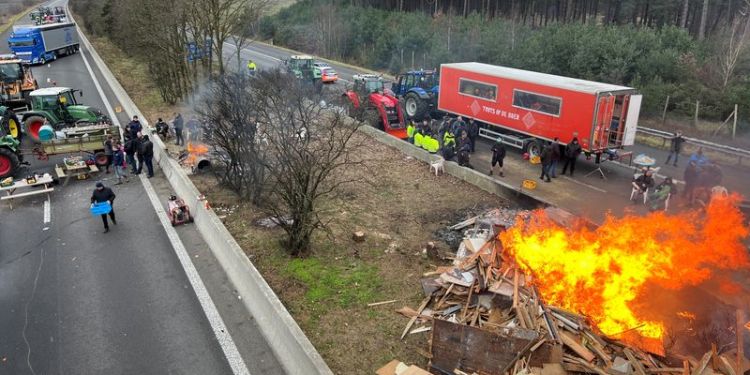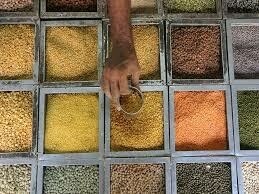5/5

© Reuters. Farmers use their tractors to block a highway near the border with the Netherlands as they protest over price pressures, taxes and green regulation, grievances shared by farmers across Europe, in Arendonk, Belgium February 2, 2024. REUTERS/Christian Levau
2/5
By Charlotte Van Campenhout and Christian Levaux
BRUSSELS (Reuters) -Farmers blocked the Dutch-Belgian border and occupied roads in Greece on Friday, while a Polish union announced plans to shut border crossings with Ukraine as European protests over prices and red tape spread.
Protests have erupted in several countries, exposing anger about low prices for produce, rising costs, cheap imports and constraints imposed by the EU’s drive to fight climate change.
While French farmers started lifting blockades after the government made further concessions, Belgian and Dutch farmers blocked motorway border crossings. A government traffic website showed that blockades on three key motorways remained in place on Friday evening.
At one roadblock, Dutch pig farmer Johan Van Enckevort, 25, warned the European Union and Dutch politicians holding cabinet formation talks not to ignore farmers’ needs.
“We have very nice products here in the EU and we want to continue to make those products. But it has to be done in a fair way, in a decent way and not with so many rules. It just can’t go on like this,” he said.
The frustration came to a head in Brussels this week, where farmers threw eggs and stones at the European Parliament and set off fireworks, demanding EU leaders at a nearby summit do more.
“The Common Agricultural Policy (CAP) has gradually become a Common Ecological Policy, without any recognition for us food producers,” Belgian farmers union ABS said in a statement.
European Commission spokesperson for Trade and Agriculture Olof Gill said the Commission’s support for the agricultural sector is a constant of the EU and that for the 2023-2027 period, more than 300 billion euros will be distributed to European farmers as part of the CAP.
“Our support is commensurate with the contribution of European farmers to our food sovereignty,” he said, adding that due to specific concerns raised by farmers, the Commission is assessing possible next steps.
At the Belgian port of Zeebrugge – which handles car imports and some fresh produce from Britain and elsewhere – farmers on Friday evening started breaking up a blockade that began on Wednesday and has left 2,000 trucks backed up outside.
Carmakers sending deliveries through Zeebrugge include Tesla (NASDAQ:TSLA), BMW (ETR:BMWG), Mercedes, Hyundai (OTC:HYMTF) and Volvo (OTC:VLVLY).
The port said it would now focus on bringing the trucks to the port or a temporary parking area at the Ostend airport.
Polish farmers’ union Solidarity on Friday announced a general strike starting on Feb. 9 with a blockade of border crossings between Poland and Ukraine.
“Our patience has run out,” it said, referring to the import of Ukrainian produce.
Polish media reported that German farmers, supported by Polish farmers, were blocking parts of the border with Poland.
Farmers have also set up blockades in the centre and north of Greece, calling for a permanent exemption on diesel taxes and faster compensation for flood-related losses.
In Portugal, where tractors blocked at least three roads linking Portugal to Spain on Thursday, one road in the southern region of Alentejo near the border remained blocked on Friday and farmers staged slow marches in several places.
Spanish farmers said earlier this week they would take to the streets in February in protest against European regulations and lack of government support.
French farmers, meanwhile, were on Friday dismantling roadblocks at dozens of sites, including several highways leading into Paris, after receiving more government pledges.
“The worst of the crisis is now behind us, but the issues we have to deal with now are ahead of us,” French Agriculture Minister Marc Fesneau said on CNEWS TV.
The French farmers said President Emmanuel Macron’s government now needed to act fast on its pledges, which have included scrapping plans to reduce tax discounts on tractor diesel, an easing of pesticide regulations, a pause on new fallow land rules, and more safety checks on food imports.
Guillaume Chantereau, 31, who grows cereals and raises chickens for eggs, said a lot of work was waiting for him at the farm, but he would be back if the government does not deliver.
“For now, we ease off, but we will not give up. We are used to hearing nice speeches, and these are not always respected, so better watch out,” he said.
Source: Investing.com





























